Stay in a ryokan - it's the single best thing you can do to encounter The Real Japan.
There are many things you can do, and experience, in the land of the rising sun that will get you closer to and give you a feel for deeper, richer cultural travel.
But, for me, there is one thing that stands above all others in delivering that enigmatic essence of feeling.
To experience The Real Japan you must stay in a ryokan.
Stay In A Ryokan: The Best Way to Experience The Real Japan
by Rob Dyer
Not all ryokan are created equal
A ryokan is an inn or guest house. But not all ryokan are equal.
Whilst there are modern versions that go by the same name, I'm talking about a traditional ryokan. Those that are built from wood in the historical style, usually just one or two storeys.
You should also do your utmost to ensure that the ryokan you choose has an onsen – that is a natural hot spring. Onsen can be found inside the ryokan, outside (a roten-buro) or even, as I once memorably experienced, a cave under the ryokan!
A traditional wooden inn
There are ryokan all over Japan. From the middle of cities, to high up remote mountains, for my money (and yours – trust me), you want the rural option.
Whilst staying in a traditional wooden inn in the middle of Tokyo is possible, it isn't what we're looking for. We want it either in the countryside overlooking farmland or natural landscapes or high up in the mountains.
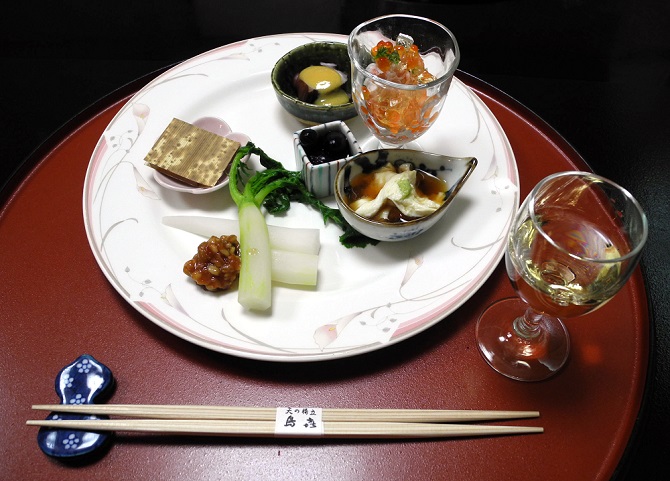
One course of a traditional kaiseki-ryori multi-course dinner
The best seasons to stay in a ryokan
You can stay in a ryokan any time of the year – although you may want to give summer a miss as it gets very hot and the humidity can be extremely high. Not a pleasant combination.
Spring is ideal as you can catch some sakura cherry blossom at the same time. Autumn gives you the fire red leaves of the season.
"A snow-covered ryokan surrounded by nothing but a silent forest is a beautiful thing"
Winter is perfect if the idea of spending time soaking outside in a natural hot spring whilst snow gently falls is part of your plan. Being able to just get through high passes, that are cut-off by heavy snow falls at the peak of the season, to emerge on the other side to find a snow-covered ryokan surrounded by nothing but a silent forest is a beautiful thing.
Irrashaimase!
When you arrive, staff wearing kimono will welcome and greet you by calling out “Irrashaimase!” or “welcome”. They will then ask you to switch from your shoes (for use outside) to slippers (for use inside) – as is the Japanese culture.
Rooms are frequently named after flowers rather than having numbers. So you're far more likely to be staying in the 'Chrysanthemum suite' than 'Room 9'.
Ryokan are, generally speaking, small, often family-run concerns, some with as few as 4 or 5 rooms. Think small and perfectly formed more than big and brash (although the latter do exist).
Forget about carrying your own bags
When you stay in a ryokan you can forget about carrying your own bags or cases. No matter how old or infirm some staff may appear to be they will insist on transferring your luggage for you, often with more strength than yourself!
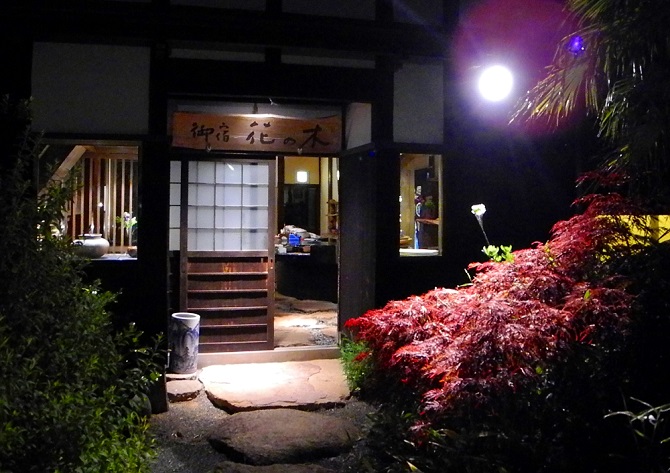
Traditional style ryokan
Customer service like you've never known
You'll be shown to your room which will be more like a multi-room suite than the cramped western style hotels you'll find in cities.
Rooms are furnished with traditional tatami mats for flooring and, for sitting on, legless chairs, called zaisu, which (just about) slide under a low-level table in the middle of the room, and floor cushions, called zabuton.
A maid will then come into the room to serve you, the weary traveller, complimentary green tea and sweets (after you've wiped your hands on the warm towel provided, of course). You will usually have to sign the guest register and confirm your dinner requirements.
Dinner will be served either in your room (the most traditional method) or in a dining room which usually doubles as restaurant and breakfast lounge.
Views across the local landscape
Some rooms have balconies, many have picturesque views across the local landscape.
You might be fortunate to have a bath in your own room. Some of which are cleverly placed in one corner with wooden screens that slide back on two sides so that your bath now not only directly overlooks the countryside (forest, mountains, rice fields, rivers and so on) but feels like it is actually positioned outside.
Your slippers will be near the entrance to your room (remember – no shoes inside Japanese houses!), and your personal yukata (lightweight kimonos) will be in a cupboard.
Embracing Japanese tradition
You are advised, henceforth, to transfer from your Western clothing (and mindset) to fully embrace Japanese tradition. You are then left to your own devices.
Time to explore the facilities of your ryokan and the landscape outside.
The facilities are set out in a guide in your room (there's usually an English translation). They can encompass all sorts of luxuries including onsen, spa treatment rooms, in-room shiatsu massage, a library (sometimes including English-language books), a karaoke room.
Walks in the nearby countryside
Some offer exterior pathways taking you for walks out into the nearby landscape, and almost all ryokan have a souvenir shop selling local foods, candy and trinkets.
There may be an entertainment room that may showcase local musicians, artists, flower arrangers (ask at reception for details on what's coming up if the schedule isn't on display). The options to keep you entertained are virtually endless.
But, at their heart, ryokan are about pampered simplicity.
Rooms that magically change
Whilst you are pre-occupied elsewhere, maids will have been at work, and you'll return to your room to find that, almost magically, the room has changed from a living space into a bedroom.
Your snug futon mattresses already made so you can slip into them for a peaceful and restful sleep. (There's nothing quite like the comforting weight of a heavy futon cover on a chilly night.)
The maid will also see that your futon are cleared away in the morning. Normally you are not expected to pay for your stay until before you leave on the last morning.
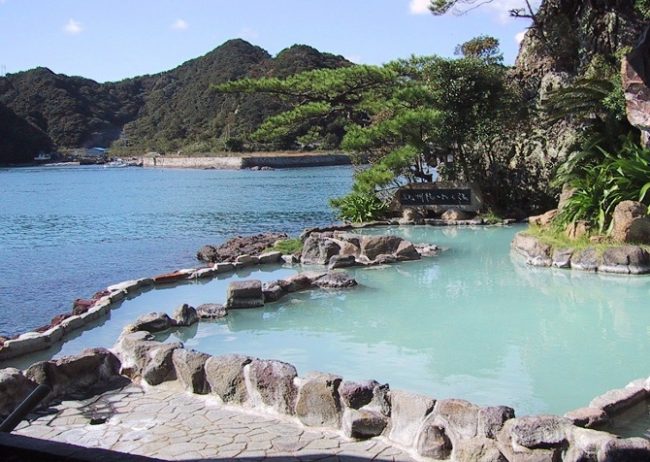
Onsen in Nachikatsuura, Japan | Photo: Chris 73 / Wikimedia Commons
You may have gathered from all this wonderfulness that a stay in a ryokan isn't often the cheapest way to rest up somewhere, but it will be worth every penny.
"I cannot emphasise this enough. Nothing gets you closer to the cultural heart of Japan like a stay in a ryokan will"
I cannot emphasise this enough. In my view, nothing gets you closer to the cultural heart of Japan, and the Japanese, like staying in a ryokan will. If you can stay for several nights the sense of relaxation, peacefulness and old-fashioned, waited-on luxury is hard to beat.
If a stay in a roykan is outside your budget don't worry. I'll be covering a more budget-conscious alternative, minshuku, in a future article - so stay tuned and subscribe so you do not miss it.
Stay In A Ryokan - Top Tips
Cash only?
Some ryokan will take payment only in cash – not credit or debit card (even though they may ask for credit card details as security). Be sure to check this in advance when making your booking so you have enough cash with you during your stay should you do need it.
Free transfers?
Ryokan in remote places will often arrange to collect you from the nearest train station, bus stop or harbour. If they do offer this they'll normally be happy to drop you off for the return journey too.
Better still, this service is usually free of charge. Ask if they offer this when making your booking enquiries.
Western dietary requirements?
The chance to eat uncommon, regional or local cuisine is, for the Japanese, usually one of the key factors when choosing where to stay in a ryokan.
Meals are usually eye-popping banquets and the price of them can be high. But as a rare treat it's worth budgeting to include dinner (if only for one night) in your stay.
One or two dishes may occasionally test even the most adventurous of Japanese foodies, so feel free to ask for a 'Western' alternative. Which can sometimes mean either an entirely Western version of dinner or, more commonly, the main dish can be switched for something more palatable. Typically, this would mean substituting beef for an esoteric raw fish dish.
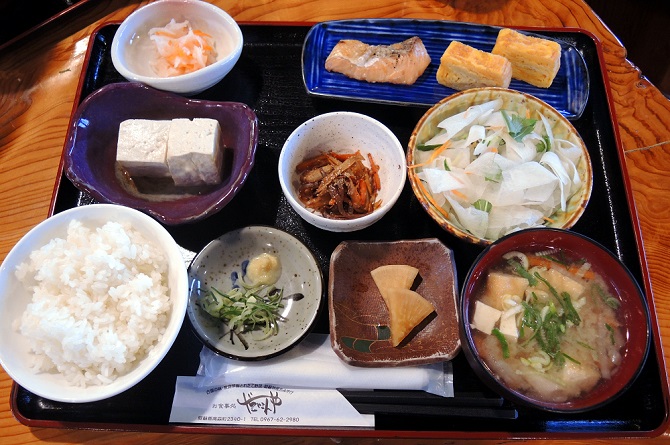
A typical ryokan breakfast comprises several dishes
Breakfast on the go
If you are planning a full day out during your stay and wish to leave early, tell the staff the day before and ask if that instead of you eating breakfast in the morning (which you don't have time for) if they can prepare a packed breakfast/picnic.
That way you can eat whilst you are travelling. If this is something they offer you might be delighted to see what they can rustle up.

About the Author
A writer and publisher from England, Rob has been exploring Japan’s islands since 2000. He specialises in travelling off the beaten track, whether on remote atolls or in the hidden streets of major cities. He’s the founder of TheRealJapan.com.
Found this guide helpful? Please share this photo:
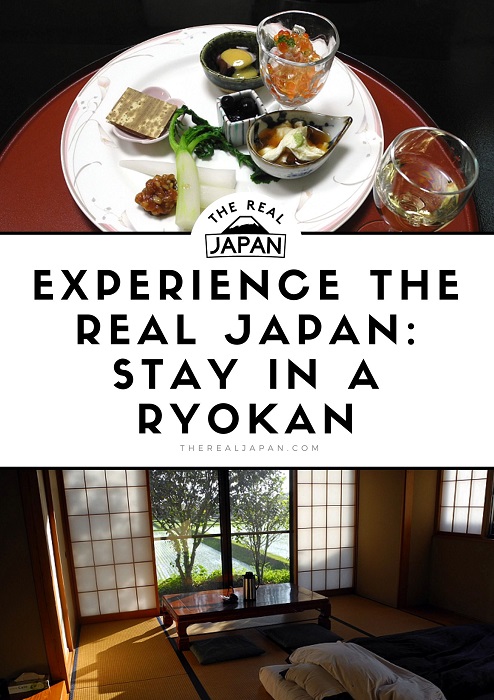
Do you want to stay in a ryokan? Have you stayed in one already? Whatever your experience share it with me and others by leaving a comment below...
Resources
The Japanese Guest Houses website is a helpful starting place to find ryokan throughout Japan:
http://www.japaneseguesthouses.com/
Japanese Ryokan Association:
http://www.ryokan.or.jp/past/english/what/index.html


My purpose is to discover Japan only when I become fluent in Japanese and N1 qualified
That’s very admirable Gautam.
When do you think you will achieve N1?
Hi there, Rob Dyer-san !
So nice this Article of all one can best expect in a Ryokan experience plus landscape view !
Loved all hints… will make sure to follow them all : #Cheers to You!!!
Sayonara !
This really is my #1 tip when visiting Japan. If you do stay in a ryokan Regina please share your experiences here. 🙂
Hi Rob! I just suscribed to your blog and received your “5 Amazing Adventures to experience The Real Japan” free guide. Your. Guide. Is. Awesome!!! I love Japan. I love its language and its culture and its people. Your guide really brings us to the core of the real japan, the one below the surface, the one where true encounters with people and culture are possible. This is definitely how I want to travel to Japan. Thank you for bringing all these great ideas to us!
Hi Josiane – thanks for subscribing – great to have you on board!
Thank you so much for the kind and generous comments and feedback. So great that you find the guide “awesome” 😀
Really pleased that you feel the guide gets below the surface of Japan – that’s just what I’m after 🙂